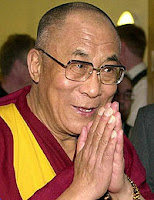 |
| Photo of HH the Dalai Lama |
This isn’t meant to be a biographical account of the Dalai Lama’s life and there are many sources to get this information. However, what I can say is that though it was unfortunate for the Dalai Lama to have to flee Tibet following China’s invasion in 1949, his refuge to India helped to raise awareness about the Tibetan cause, as well as introducing Tibetan Buddhism to the West. Not only that, but the Dalai Lama has been open to new knowledge gained from scientific enquiry and has met top scienties from around the world across various areas to discuss what makes us, basically, the nature of reality. In addition, I admire him because he denies that he is a god-king and, recently, he gave up his role as a political leader and declared that the people of Tibet should elect their own leaders. Moreover, while retaining his position as the spiritual leader of the Tibetan people, he does not exclude a time after his death when there will be no longer the need for the institution of the Dalai Lama.
I think the first time I recall seeing the Dalai Lama was when I was about 14 years old. Even if I couldn’t understand it, I sensed this man projected something unique that you rarely witnessed in daily life. A feeling of authentic engagement with the audience, a sense of unconditional acceptance and a feeling that he was talking to you on a human level. My interest in Buddhism would grow from there but given the mixed information about Buddhism I got from those who should have known better, I always held back from delving into understanding what Buddhism was about or to read works by people who practice and teach it. Perhaps I was afraid of going against the faith I was brought up to believe and, honestly, I was still rather young and immature in certain matters - even if I had always struggled in knowing why people die or suffer in this world.
In addition, there are still plenty of misconceptions about Buddhism that people in the West have. While it’s true that Buddhists believe in cyclic existence or reincarnation, it would be wrong to reduce millennia of Buddhist doctrine to just that belief without examining its basis or that the actions we do in our lifetime have consequences and that these actions will leave an impact on our current lives and possible futures. There is also the idea that Buddhism is atheistic which is only partly true because Buddhism holds that whether there exists a God is problematic as it holds that everything arises dependently on other causes and conditions and thus nothing (including a creator God) can exist as such. It has also been argued that Buddhism is nihilistic and that it denies the existence of things.
However, the Buddhist doctrine, if you study it closely, is commenting on how reality exist and not whether reality exists. For example, you are able to read and understand this text because you have learned language, and English at that. If it had not been for you having learned toassociate the symbols of the alphabet and that each letter stands for a sound and that a collection of sounds and letters produce words and speech, then this text would be meaningless. And while you’re there, even the words we use have their own history and we have our personal relation to certain words. This is especially true of words with strong emotional content such as “love” or racist insults. Now, nobody will contest that words do exist but Buddhist doctrine is making us aware that words depend on other factors to become what they are - in this case. Therefore, without knowing the code for deciphering language, and understanding what words represent and ultimately to understand the concept behind those words, then this text would be not better than a random patches of black shapes Z surrounded by white spaces. And then even the words “black”, “shapes”, “white” and “spaces” have more than one meaning, such as those relating to colour, race, place, form, etc.
Of course, I can’t really deal with all I’ve learned on Buddhism from my reading of the Dalai Lama’s translated works. Nor do I pretend to be any expert but just a beginner. Indeed, these past months have been literally life changing and I still have much to learn about Buddhism and the meaning of happiness. I don’t regret my upbringing and early spiritual interest in understanding the purpose of life. The more I sincerely wished to understand what other beliefs, the more I realised that there was a common longing to find “home”. I don’t even claim that Buddhism answers all the questions about life but, I feel that it has touched me in a profound way that words just cannot fully capture.
I have written a lot already. So I’ll leave you with a quote from the Dalai Lama, which in a simple way, captures the entire philosophy of Buddhism:
“If you want to be happy, practice compassion.
If you want others to be happy, practice compassion”
HH The 14th Dalai Lama (6 July 1935 - ...)
Online resources:

No comments:
Post a Comment